When I moved to the south in 2014, my mom said, “why the hell would you move to Alabama?” While partially worried for my safety as a queer woman and partially hating me for moving far away from her, I think her concern was rooted in a fear of the south instilled in many northerners by media and false history. She couldn’t understand why I would leave the state of Vermont to live and work in such a “hateful and racist place.” I, too, had reservations at the time, but something drew me here and I’ve spent the last five years challenging my own assumptions. I never intended to fall in love with this landscape as much as I did. The friends, organizers, teachers, young activists, bakers, mamas, grandmothers, and eventually chosen family I’ve met here have helped me find truer versions of myself and supported me through the most pivotal moments in my life.
When I hear condescending rhetoric now, whether in conversations with family, on the news, or in movement spaces, I jump to defend Alabama, despite all the bullshit. Because this place is much more than its Kay Ivy’s and Brian Kemp’s. More than its racism upheld by those in corporate and political power. More than bigots and confederate flags. While those things do exist here, they also exist across the nation, and it is often forgotten that the south is also home to transformative resistance. Where people are building cooperative economies , fighting on the frontlines of climate change, and creating mutual aid centers. For me and many other queers and radicals here, feminist bookstores initiated this realization, continue to deepen my understanding of the world, and strengthen my commitment to building community and pursuing a collective vision for justice.
Feminist bookstores across the southeast, and nationwide, act as community hubs for political education and organizing by creating radically inclusive space for discussion, events and skillshares, as well as providing a curated selection of intersectionally feminist titles. While daily operations, history, principles and traditions differ at each, Charis Books & More (GA), Firestorm (NC), Wild Fig (KY), Violet Valley (MS) and Burdock Book Collective (AL) serve as entry points for many curious readers while simultaneously cultivating “ brave space” for strengthening theories and practices for liberation movements. Understanding the history of these spaces, the resources they provide and their dreams for the future might encourage you to forgo 2-day shipping and experience these bookstores for yourself- whether virtually or in person.
The first time I walked into Charis Books & More in Atlanta, with the smell of warm coffee and sugar cookies wafting in the air and the floors creaking beneath me, I felt at home. A curated selection of new book jackets sprung out at me from all directions and I suddenly knew my afternoon plans were trashed. I’d spend the next three hours accumulating books, talking to other patrons and staff, and eavesdropping on a parent read “Whoever You Are” to their four-year-old. I cozied up on a well-loved couch dove headfirst into worlds that mirrored my own and ones that were far different. Charis was not the first independent bookstore I’d been in, but there was something special about that house in Little Five Points. Perhaps it was the history breathing in its walls, the free condoms, the fliers for political education workshops or diverse array of ideas and identities represented on their shelves. Whatever it was, it was clear that Charis is more than a bookstore.
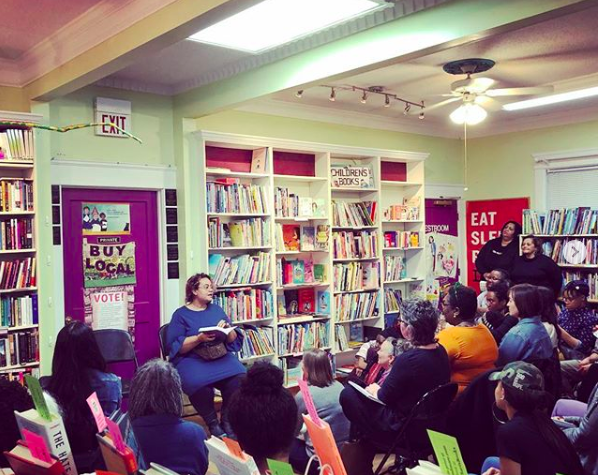
adrienne maree brown at Charis Books & More in Atlanta
A growing thirst for safe and affirming spaces in my home of Birmingham, Alabama, coupled with a shared, insatiable love of reading led my good friend Katie Willis and I to search for other feminist bookstores. We discovered a much richer history than either of us had imagined and were inevitably driven to start our own. We read The Feminist Bookstore Movement: Lesbian Antiracism and Feminist Accountability by Kristen Hogan, who documents the incredible work of bookwomen from the 1970s through the 1990s. At the peak of the movement, there were over 120 feminist bookstores transnationally that were a part of the Feminist Bookstore Network (FBN). The founders of these stores recognized a need for a hub where women “could learn [the] relational and advocacy skills they needed for changemaking” (Hogan 7). These bookstores were “different from both independents and chains, [and] uniquely served as welcoming spaces, brimming with feminist information” (Hogan 7). Bookwomen were dedicated to keeping feminist authors in print and staying accountable to a shared set of principles grounded in racial justice. In a widely distributed newsletter, booksellers “offer[ed] each other advice about how to start a new bookstore, talk[ed] with each other and with publishers, called each other on their racism, found children’s books representing lesbians, held letter-writing campaigns to get books back in print, and more” (Hogan 36). Despite the strong network, the rise of Amazon and chain bookstores inevitably put many feminist bookstores out of business in the early 2000s and reading became less revolutionary. Birmingham AL, for example, had a feminist bookstore called Lodestar that closed around that time. With online book purchases, readers miss the opportunity to snuggle up on a couch or to chat with a passionate bookseller- well-versed in a diverse array of literature- who might introduce new concepts or authors. I have observed a pervasive longing for space to ask big questions, a space that facilitates learning through literature and invites people to connect. This type of space was nurtured by hundreds of bookwomen four decades ago and that legacy lives on in the often unseen feminist bookstores across the country today.
Charis’s unique 45 year history provides bridge through both time periods and insight on what it takes to keep a highly visible and political storefront afloat. It is the dedication to intersectional feminist movement work, rather than the ability to compete with large scale booksellers, that has allowed Charis to carry out its mission. E.R. Anderson, the current executive director of Charis Circle, the bookstore’s nonprofit arm, described Charis’ role in movement spaces as very multifaceted: “I have been very convicted that we have a role to play in intervening in the problematic “white feminism” space. White women wield a lot of power and don’t wield it well. Many white women are rushing into community work without much knowledge of intersectionality. With popular education, support groups and books, they can be better stewards of their agency in multicultural spaces.” The other important role Charis plays is “becoming a space to launch Black women’s literary careers. [Charis is] hosting more and more debuts of Black women’s novels and nonfiction. Authors know they can come and get a giant audience, that [Charis] can set them on a journey of success.” In addition to this work, their events calendar overflows with author readings, Trans and Friends meet ups, race-conscious parenting groups, and political education discussions on various topics like fighting banned books and reclaiming judaism from zionism. Charis continues to be special because of the “More” in its title.
Charis isn’t the only bookstore with a robust list of community programming. Firestorm Books & Coffee Cooperative in Asheville, North Carolina, for example, offers weekly recovery groups, harm reduction workshops, film screenings, books to prisons programs and monthly letter writing sessions. After spending all of fifteen minutes in the store in 2018, the organizer of Asheville Books to Prisons program started telling me about their work as he brought several boxes into their back room for a logistics workday. Most of the programs operating in Firestorm are actually run by residents of Asheville instead of staff members. Libertie Valance and Beck Redacted, two co-owners, shared that they were most proud that “many people feel very welcome in the space.”
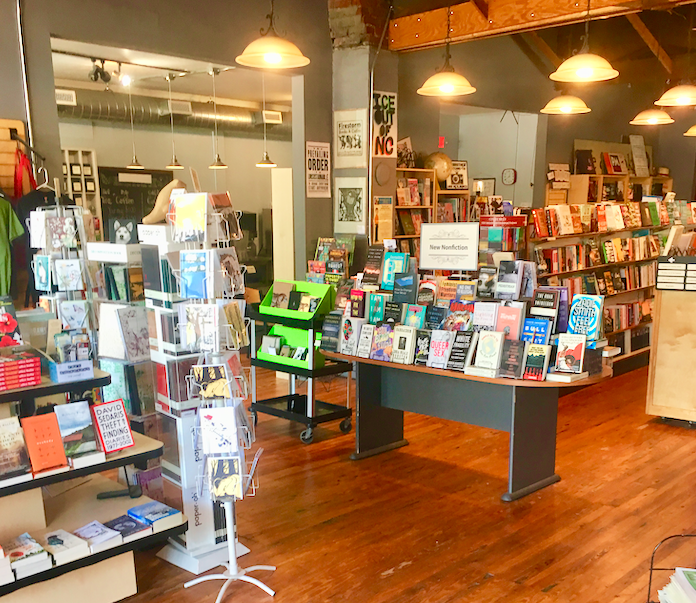
Firestorm Books in Asheville, NC
Firestorm is grounded in the tradition of anarchist infoshops, though they also identify as feminist. Beck explained they’re unique model as a worker owned cooperative: “We make all of our decisions using a consensus process. We operate without bosses or managers. Basically we have a lot of meetings.” Libertie hopped in to explain that there is a lot of delegation and not every decision comes down to a vote. Through skillshares and morning meetings, the staff hold each other accountable to the everyday operations. Collectively, they are tackling some big challenges, including gentrification. Firestorm has been a refuge for a quickly changing neighborhood, but with rent prices increasing and five more years left on their lease, they worry: “we are very scared of […] two possible outcomes. One […] that we adapt to the changing neighborhood that causes us to lose some of our underlying values. The other is that we hold on to our values effectively but, as a result, are swept away by the way in which the neighborhood changes and are not able to survive that transition. This speaks to what it looks like to survive under capitalism as an anticapitalist project.” Bookwomen in the 70’s and 80’s were facing similar barriers and perhaps lessons can be gathered from the past as Firestorm pursues new solutions. In addition to the strong community support they’ve gathered with their Sustainer’s Program, their cooperative decision-making structure is one that often brings out creative ideas and will hopefully set the bookstore on a path toward sustainability.
Firestorm shares much in common with Wild Fig Books & Coffee, located in Lexington KY. Wild Fig, also a worker-owned cooperative, was reopened last November. The original owners, Crystal Wilkinson and her partner Ronald Davis, struggled to keep it financially sustainable. Despite its hardships, the community has kept it afloat: “Every time the Fig has needed something, the community has stepped up to make it happen… such a broad, diverse group of people saw the Fig as valuable and sacred enough to save.” April Taylor, one of the current co-owners, says. Taylor, an activist and organizer, led a successful 30-day Kickstarter campaign to reopen the Fig and keep it at least 60% Black owned. But the financial sustainability is still a very present fear for Taylor “ since safe, affirming space is not a commodity, [I worry] we won’t be able to make the bookstore/coffee shop profitable enough to stay in the neighborhood we are in that is rapidly gentrifying.” The Wild Fig demonstrates a commitment to community building work by hosting public events like stitching groups, bi-weekly drum circle, comedy nights and a Drag Queen Story Time!
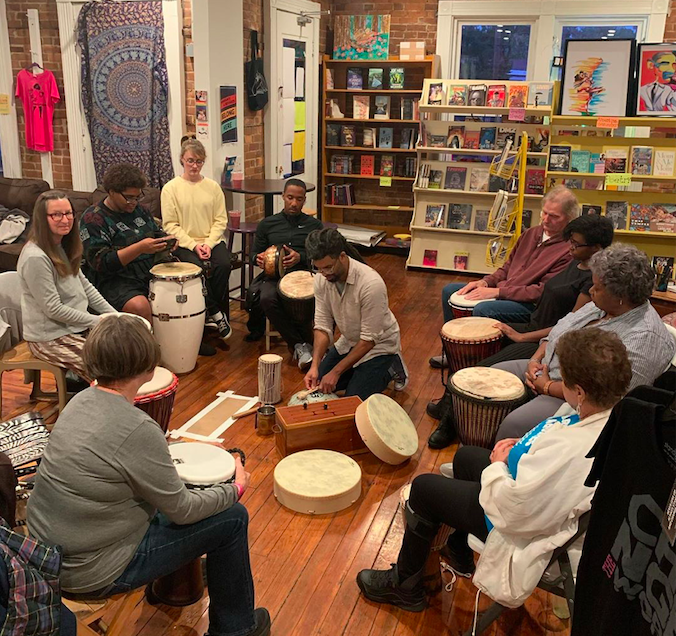
Drum Circle at Wild Fig
About seven hours southwest of Wild Fig’s front porch, in the small rural town of Water Valley Mississippi, you’ll find a queer bookstore called Violet Valley Books. Jaime Harker, a professor at the University of Mississippi and author of The Lesbian South, opened Violet Valley in 2017. Much of Violet Valley’s mission is grounded in queer visibility: “I am most proud of just our consistent insistence on creating a public, inclusive space, and insisting, day in and day out, on our right to claim public space in the small town South for LGBTQ youth in particular, and feminist, queer, multicultural ideas and events in general.” Being rural, Violet Valley was able to secure a space for very affordable rent, but Harker struggles to find the funding and financial capital to stay open full time. One of her goals is to afford to pay a part time bookseller to operate the store throughout the week: “anyone with a passion for bookselling who wants to live in a small up-and-coming Mississippi town should get in touch.” Harker’s passion for Violet Valley, while recognizing the constraints of bookselling, is inspiring; “I’d love to see feminist bookstores in every community, large and small, creating support and hope and opportunity for activism, community, and inclusion.”
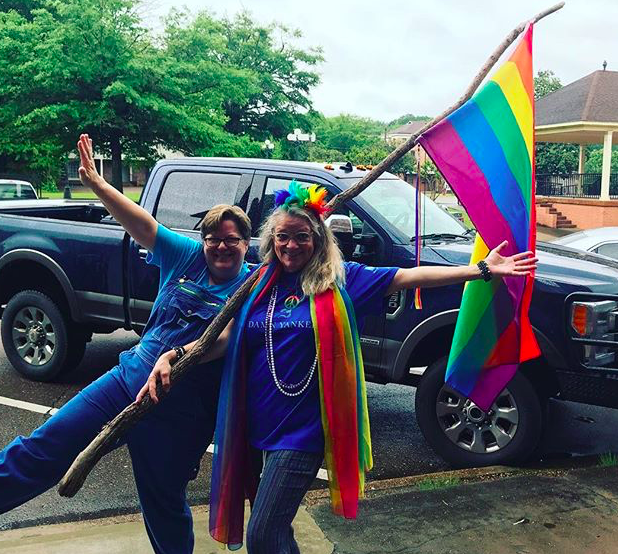
Founder Jaime Harker (left) at local Pride Parade, representing Violet Valley Books in MS
It is with these sentiments that Katie Willis and I took the plunge with the Burdock Book Collective in our city of Birmingham, Alabama. While we loved the queer road trips to Atlanta, losing our voices to the Dixie Chicks, Tracy Chapman and the Indigo Girls (there and back obviously), we longed for a space to browse and learn about new books, a place everyone could feel comfortable being their complete authentic selves, in our own city. A place that was vocal about politics and unafraid and steadfast in advocating for the liberation of all people. With 500 dollars of our collective savings, book donations, advice from other feminist bookstores, and volunteers, we threw our first fundraiser in August of 2018. A year later, we are still far from the vision we have for Burdock. We still work full time, farming and baking, but we are exploring new ways to expand our open hours and partner with new groups! We’ve hosted authors, like Charlene Carruthers and Cindy Milstein, and facilitated reading groups and art workshops, but our dreams extend to writing classes and herbal medicine skillshares, sex education trainings, queer dance parties, Books to Prisons programs and so much more! One day we hope to have the impact that other feminist bookstores, both past and present, have had.
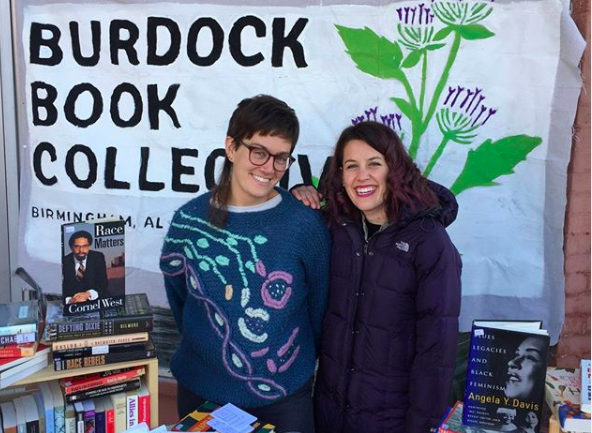
Katie Willis (left) and Meagan Lyle (right) selling feminist titles for Burdock Book Collective
Perhaps unsurprisingly, booksellers across the region expressed concerns of financial and emotional sustainability. I asked E.R. Anderson (Executive Director) and Sara Luce Look (co-owner) at Charis for some guidance on longevity. Charis was hurt tremendously by the recession and the 2008 housing crisis, which inconveniently happened in conjunction with the launch of Kindle and Amazon. “It was the roughest period emotionally and economically [and] what kept us open was that we believed that something would shift. We had faith in that we were right, our principles were right. Charis is an essential place in the world. I can’t imagine a world without Charis” E.R. said. Sara Luce Look and E.R. have been at Charis for over two decades. They have gone into personal debt and worked tirelessly for small salaries- just what Charis could afford- for long periods of time. E.R. acknowledged the privilege of being able to take financial risks- having family members to turn to in the most dire situations. As organizers and community builders, they are dedicated to leveraging their privilege to ensure Charis continues to operate and that is hella inspiring to me.
Despite my admiration for Charis, ideally folks don’t have to go into personal debt to keep spaces like this alive in our communities, which begs the question, how can we do better to support each other in tough times? After all, these bookstores are often very fragile. They operate on very narrow margins and depend on the dedication and energy of booksellers. “Supporting these spaces is really important–both financially, of course, but also in time and public acknowledgment.” Jaime Harker of Violet Valley told me. What tools and/or collective skills can we tap into to sustain these necessary community spaces? Sara Luce Look recalls the impact of the FBN newsletter: “I really miss the feminist bookstore network. I started [at Charis] in 1994 it was the height of feminist bookstores (more than 120+) and I didn’t know it! It was before we had email and the internet. We would get the FBN booklet every month. We would take turns with it and highlight and talk about it… We contributed to it too.” The FBN’s full-time employee coordinated in-person gatherings at larger conferences too. The connections between feminist booksellers were vital then and seem to be even more needed now. The list of feminist bookstores in the U.S. and internationally is growing, but what could the network look like today? And, who would be in it?
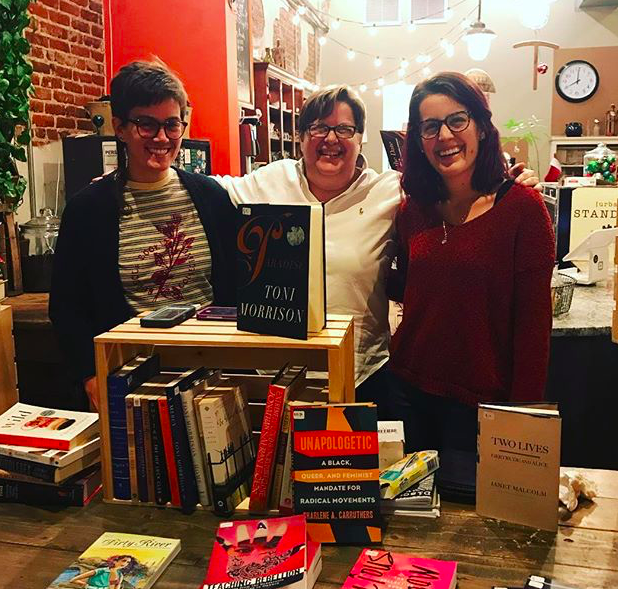
Jaime Harker of Violet Valley visits the Burdock Book Collective for a reading of The Lesbian South
A year or two after my first visit to Charis, the nation was dumbfounded and outraged by the results of the 2016 election. From the pussy hats on the National Mall, to the protestors wearing Handmaid’s Tale costumes in Montgomery, feminism is squeezing out the seams of this political moment for good reason. With growing momentum, many wonder if this is a trend that will die out after this ridiculous bigot gets voted out of office (fingers crossed) and we’re all “safe” again. Will self-identified feminist bookstores, that used to be general bookstores, remain dedicated to intersectional radical principles when it’s not as “popular” to do so? Who’s going to hold the next elected officials accountable regardless of their party affiliation? What is the true difference between a general bookstore run by feminists and a feminist bookstore? The answers to these questions could provide a base for a new digital-age network, differentiated from networks that currently exist like Southeast Independent Booksellers Association and the American Booksellers Association, which -while valuable- don’t always address the issues specific to feminist bookstores. And, while much is left unanswered, we are certainly at a tipping point of collaborative feminist process and I doubt it will be long before brewing ideas for collaboration spill into realities.

I’m personally challenging everyone who reads this to bookmark this article and to come here when their browser carries them to amazon or their feet to B&N, order through these bookshops who need your orders!
And if you can, pick one shop, browse their staff picks and order a book (or get your Christmukkah bookshopping done) right now.
Yes, yes, yes. In general, operating an indie bookstore is anywhere as much a calling as a business, but operating a feminist, queer indie bookstore in a red state transcends that calling into a mission. And at least a couple of the stores mentioned in this article are affiliated with IndieBound (https://indiebound.org) which makes online ordering extremely easy if you can’t visit one in person.
bookstores are one of my favorite places and i know so so so many other queers who feel the same. off the top of my head, i can think of two women owned bookstores that opened in Baltimore in the last year, and i’ve made a point to purchase books from them that i would’ve otherwise gotten at amazon. planning to walk over and pick up In The Dream house tonight! thank you for writing this
Please someone open a feminist bookstore in Florida! Or really any independent bookstore in South Florida….. We literally have 1. I promise people here do read
This is so exciting! And thank you for lifting up the amazing resistance work in the South.
I am originally from Huntsville, Alabama, where a queer bookstore called Opening Books gave me hope in my high school years in the early ’90s. Since then, in every city in the world I have ever visited, I have looked for the queer or feminist book store. I’m so glad to know about this Book Collective in Birmingham. I pass through there a lot, and my daughter (also a lesbian) is graduating from B’ham Southern in December, and making her home in B’ham. I will certainly be visiting ya’ll with her!
Opening Books only lasted a few years- but I feel like I might have suffocated without it. Hell yes we should support these places, at every turn.
Wow that’s amazing! I haven’t heard of Opening books, do you know who the founders were? I’d love to learn more about what they were doing in Huntsville. And definitely stop by- i look forward to meeting you! We are open Wednesdays and Thursdays from 3-7 currently but hope to expand our hours soon.
Yes! Opening Books was such a haven to my queer friends and I in our high school years in the late 80s/early 90s. I can’t stress what a huge impact it made to have a place where we misfits felt safe and at home. I know it was especially important for my friends to have queer role models to remind them things would get better and there was a brighter future ahead for them after high school.
This article made me so happy… I just moved to the Birmingham area and I have been desperate to find queer, affirming spaces to hang out. I can’t wait to visit your bookstore!!!
We’d love to have you! We’re open Wednesdays and Thursdays from 3-7 currently! Check us out on instagram and facebook for updates on events and author readings!